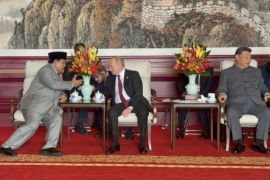November 11 has been celebrated as an unofficial "singles` day" in China since the 1990s -- as the date is composed of the number one -- and it is seen as a good day to marry and leave the single life behind.
But this year is viewed as particularly special because the year also ends in the number 11.
More than 200 couples packed into a marriage registration office in downtown Shanghai Friday morning, some having queued for hours before its doors opened to ensure they were among the first to marry.
Hotel manager Li Xue (26) originally planned to marry in February next year, but she brought forward her plans because of the special day.
"We are getting married on the day of `six ones`. We will no longer be single on the once-in-a-century singles` day," she told AFP as she waited for her turn to marry.
Shanghai alone had more than 3,300 couples who booked to marry on Friday, but the final tally could be higher as it does not include people who walk-in unannounced, a civil affairs bureau spokeswoman told AFP.
Other Chinese cities reported a similar mania for marriage.
In the eastern city of Nanjing, more than 3,000 couples planned to marry on Friday, ten times the usual daily average, the official Xinhua news agency said. More than 1,300 pairs will tie the knot in eastern Hangzhou city.
The day, though not officially acknowledged by the government, has become a commercial bonanza.
On the popular on-line shopping site Taobao Mall run by Internet giant Alibaba, merchants slashed prices by up to 50 percent in honour of the day.
Chinese media used the event to probe the phenomenon of so-called "leftover women", typically women in their 30s who are unable or unwilling to marry, as higher incomes and greater opportunities make some delay settling down.
"Women have access to higher education and many have been given the chance to compete with men in the workplace," Zhu Fuqiang, an economics professor at Zhongshan University, told Xinhua.
"They do not need to attach their livelihoods and happiness to men," he said.
(U.C003)
Editor: Priyambodo RH
Copyright © ANTARA 2011











